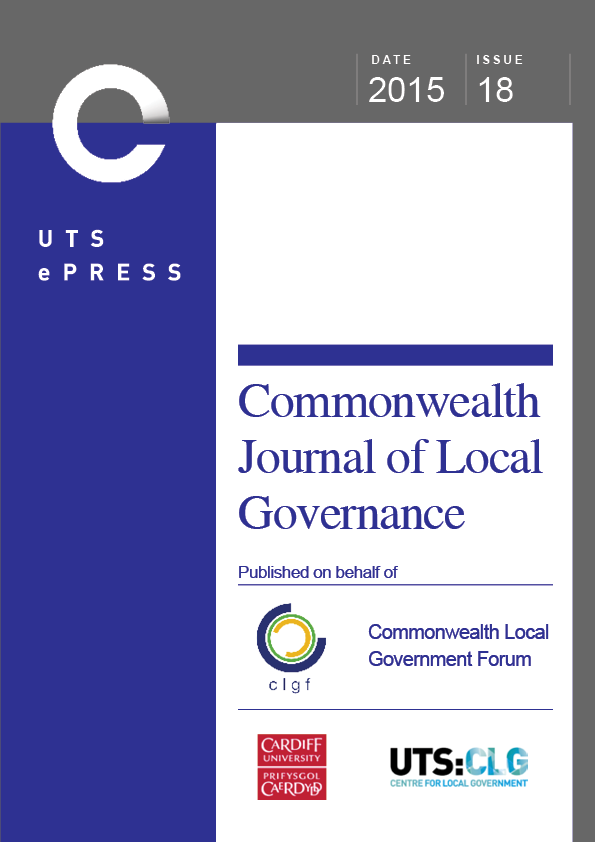Mobilising internally generated funds to finance development projects in Ghana’s Northern Region
Main Article Content
Abstract
This paper assesses the effectiveness of Metropolitan, Municipal and District Assemblies (MMDAs) in Ghana’s Northern Region in mobilising internally generated funds (IGF) to finance development projects. The study gathered both primary and secondary data from three MMDAs: Tamale Metropolitan Assembly, Yendi Municipal Assembly and Saboba District Assembly. It employed a multi-stage sampling technique of questionnaires, interviews, focus groups and key informant interviews to collect data from respondents and obtain a snapshot of their situation in the 2013 fiscal year. It established that fines, property rates, licences, annual rates, investment income, permits, sales of tender documents, and business taxes were potential sources of revenue for the assemblies. Also, the study identified a range of strategies employed by assemblies to raise revenue: engagement of revenue collectors, use of a mobile revenue taskforce, registration of businesses, visits to markets and business centres, commission payments for revenue collectors, security checkpoints, incentivisation of revenue collectors, establishment of revenue collection points, and rotation of revenue collectors. Nevertheless, the study found that the MMDAs studied could not meet their IGF revenue targets for the 2013 fiscal year, with all three falling below 50%. This poor performance was attributed to: inadequate logistics to support effective IGF mobilisation; under-declaring of revenues; not enough revenue collectors; poor supervision and monitoring; poor compliance by ratepayers; corruption; political interference; inadequate knowledge and skills among revenue collectors; poor service delivery by the assemblies; ineffective collaboration; and lack of revenue data.
Article Details
Issue
Section
Authors who submit articles to this journal from 31st March 2014 for publication, agree to the following terms:
a) Authors retain copyright and grant the journal right of first publication with the work simultaneously licensed under a Creative Commons Attribution License that allows others to share and adapt the work with an acknowledgement of the work's authorship and initial publication in this journal.
b) Authors are able to enter into separate, additional contractual arrangements for the non-exclusive distribution of the journal's published version of the work (e.g., post it to an institutional repository or publish it in a book), with an acknowledgement of its initial publication in this journal.
c) Authors are permitted and encouraged to post their work online (e.g., in institutional repositories or on their website) prior to and during the submission process, as it can lead to productive exchanges, as well as earlier and greater citation of published work (See The Open Access Citation Advantage Service). Where authors include such a work in an institutional repository or on their website (ie. a copy of a work which has been published in a UTS ePRESS journal, or a pre-print or post-print version of that work), we request that they include a statement that acknowledges the UTS ePRESS publication including the name of the journal, the volume number and a web-link to the journal item.
d) Authors should be aware that the Creative Commons Attribution (CC-BY) License permits readers to share (copy and redistribute the work in any medium or format) and adapt (remix, transform, and build upon the work) for any purpose, even commercially, provided they also give appropriate credit to the work, provide a link to the license, and indicate if changes were made. They may do these things in any reasonable manner, but not in any way that suggests you or your publisher endorses their use.
For Issue 13/14, and all issues before, the following copyright applied:
Authors submitting a paper to UTS ePRESS publications agree to assign a limited license to UTS ePRESS if and when the manuscript is accepted for publication. This license allows UTS ePRESS to publish a manuscript in a given issue. Articles published by UTS ePRESS are protected by copyright which is retained by the authors who assert their moral rights. Authors control translation and reproduction rights to their works published by UTS ePRESS. UTS ePRESS publications are copyright and all rights are reserved worldwide. Downloads of specific portions of them are permitted for personal use only, not for commercial use or resale. Permissions to reprint or use any materials should be directed to UTS ePRESS via the journal's main editor, Alison Brown, journal@clgf.org.uk
